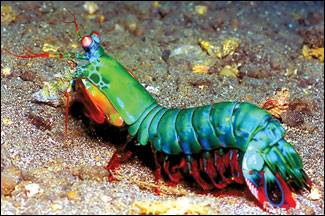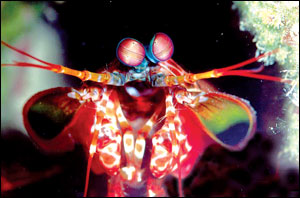|

Shrimp's eye
points way to better DVDs
LONDON - The amazing eyes of a giant shrimp living on Australia's
Great Barrier Reef could hold the key to developing a new type of super
high-quality DVD player, British scientists said on Sunday, October 25.
|

Mantis shrimps have the most complex eyes in the animal kingdom. |
Mantis shrimps, dubbed "thumb splitters" by divers because of their
vicious claws, have the most complex eyes in the animal kingdom.

They can see in 12 primary colours, four times as many as humans, and
can also detect different kinds of light polarisation - the direction of
oscillation in light waves.
Now a team at the University of Bristol have shown how the shrimps do
it, using remarkable light-sensitive cells that rotate the plane of
polarisation in light as it travels through the eye.
Manmade devices do a similar thing in DVD and CD players, but they
only work well for one colour, while the shrimp's eye operates almost
perfectly across the whole visible spectrum from near ultra-violet to
infra-red.
Transferring the same multi-colour ability into a DVD player would
result in a machine capable of handling far more information than a
conventional one.
"The mechanism we have found in this eye is unknown to human
synthetic devices. It works much, much better than any attempts that
we've made to construct a device," researcher Nicholas Roberts told
Reuters.
He believes the "beautifully simple" eye system, comprising cell
membranes rolled into tubes, could be mimicked in the lab using liquid
crystals.
Details of the mantis shrimp research were published in the journal
Nature Photonics.
Just why the mantis shrimp needs such a rarefied level of vision is
unclear, although researchers suspect it is to do with food and
reproduction.
Courtesy: Reuters
'Freezer plan' bid
to save coral
The prospects of saving the world's coral reefs now appear so bleak
that plans are being made to freeze samples to preserve them for the
future. A meeting in Denmark took evidence from researchers that most
coral reefs will not survive even if tough regulations on greenhouse
gases are put in place.
Scientists proposed storing samples of coral species in liquid
nitrogen. That will allow them to be reintroduced to the seas in the
future if global temperatures can be stabilised. Legislators from 16
major economies have been meeting in the Danish capital, Copenhagen, to
try to agree the way forward on climate change. The meeting has been
organised by the Global Legislators Organisation for a Balanced
Environment (Globe). Losing the fight.

One of the issues they have been considering is what to do with coral
reefs, which make up less than a quarter of 1 per cent of the ocean's
floor. Yet the reefs are a key source of food, income and coastal
protection for around 500 million people worldwide. At this meeting,
politicians and scientists acknowledged that global emissions of carbon
dioxide are rising so fast that we are losing the fight to save coral
and the world must develop an alternative plan. Freezing samples for the
future may be a necessary option.
"Well it's the last ditch effort to save biodiversity from the reefs
which are extremely diverse systems," said Simon Harding from the
Zoological Society of London (ZSL).
"It would take other work to try and reconstruct the reef so that you
can start the process of building up a reef again," he said.
"That is something that needs to be looked at in detail, but we can
definitely store the species and save them in that way."
According to recent research, one of the world's most important
concentrations of coral - the so-called Coral Triangle in South East
Asia - could be destroyed by climate change before the end of this
century with significant impacts on food security and livelihoods.
Courtesy: BBC News
Name: L.L. Sandali Suhara
Alwis
Gender: Female
Age: 13
School: Pandura Balika MV,
Hobbies: Reading story
books, watching TV, listening to the radio and music, playing chess
Pen-pals preferred from:
Sri Lanka, America, India, Australia, Japan, France, USA, UK
Age group: 13-20
Address: 125/A, Patagiwata,
Morontuduwa, Sri Lanka.
***
Name: Nirogini
Suntharalingam
Gender: Female
Age: 12
School: J/Periyapulam Maha
Vidyalam
Hobbies: Watching TV,
reading books, drawing, listening to music and playing netball
Pen-pals preferred from:
Any country
Age group: 12-15
Address: No. 1169 KKS
Road, Jaffna, Sri Lanka.
***
Name:Halwala Kankanamge
Prarthana Srimali
Gender: Female
Age: 16
Hobbies: Reading novels,
watching TV, gardening, listening to music
Pen-pals preferred from:
China, India, England or Australia
Age group: 16-18
Address: Kanahintota,
Miriswaththa, Bentota, Sri Lanka. |

